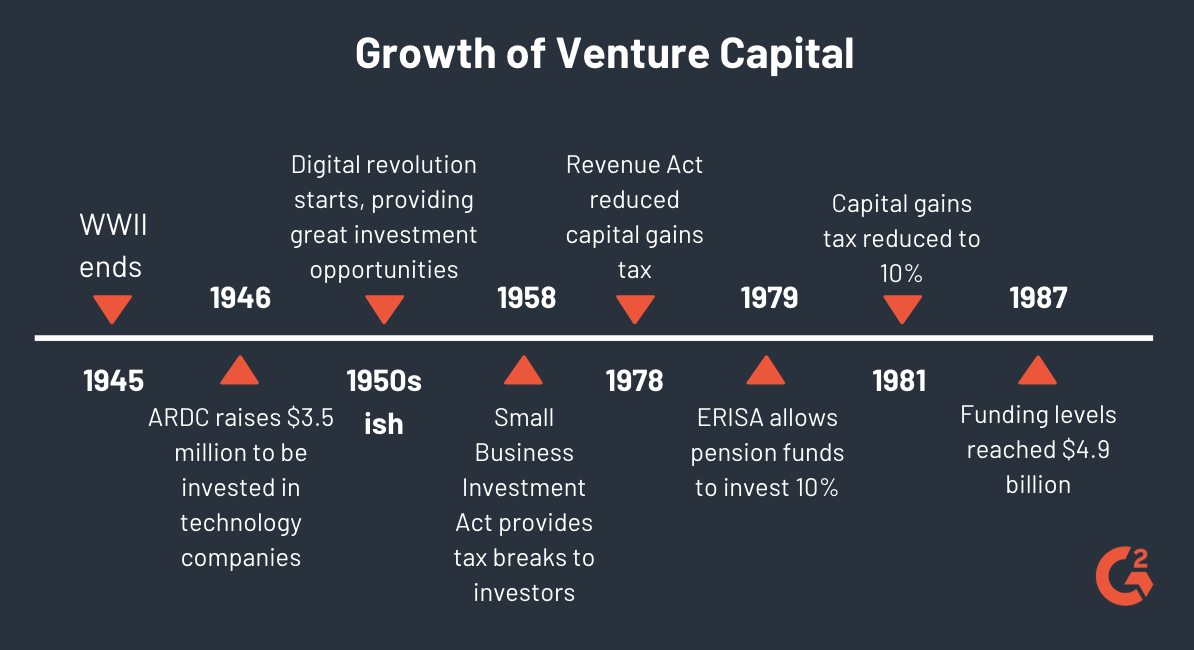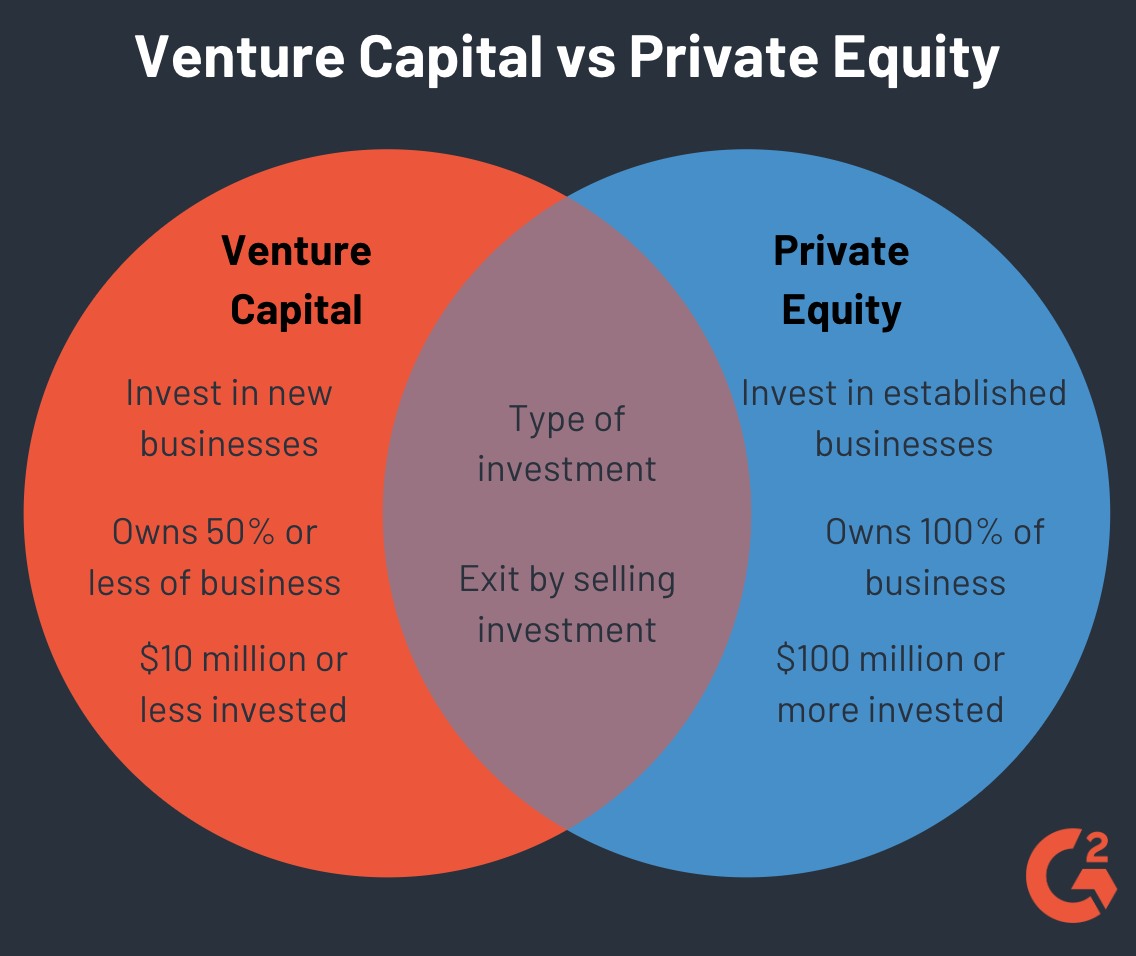The startup trend is showing no signs of slowing down.
However, finding a sufficient source of funding to fuel their startup remains a big challenge for small business owners. While some might ask for money from friends and family or learn the tricks on how to get a small business loan, others might turn to venture capital. These businesses seek investments from VC firms who use venture capital management software to source, track, and manage investment deals.
What is venture capital?
Venture capital is a form of private equity financing that investors use to fund small businesses or startups that show long term growth potential. In exchange, the business owner will give the venture capitalist equity, or partial ownership, in their business.
This is a great funding option for businesses that don’t have much of a history and are unable to get funding elsewhere.
Venture capital can come from well off individuals, investment firms, or any other type of financial institution. While it typically takes the form of monetary funds, venture capitalists can also contribute their business experience, which can sometimes be equally as valuable to a first-time business owner.
While venture capitalists get equity in return for their investment, which also means ownership and a say in the decision-making process, these investments pose a big risk. However, this is easily justifiable with the potential of getting a decent return and being a partial owner of a successful business.
History of venture capital
Before venture capital, funding for small businesses from investors was limited to private equity, which is when someone invests in a business that is not publicly traded and restructures it to make it more successful.
Venture capital developed as its own industry after World War II. It all started when Georges Dariot, the father of venture capital, started the American Research and Development Corporation (ARDC) in 1946 and raised $3.5 million to invest in technologies that were developed during the war.

The growth of technology did a lot of the heavy lifting in supporting the growing popularity of venture capital. New businesses and innovations were emerging at a rapid pace, and they all showed significant signs of growth and potential, making them enticing for venture capitalists.
On top of that, a change in the Small Business Investment Act provided a tax break for those who invested in small businesses. A couple of years later, the Revenue Act reduced capital gains tax by almost half, from 49.5% to 28%. Not long after that, the Employee Retirement Income Security Act (ERISA) allowed pension funds to invest 10% in the industry. This led to a large amount of capital being distributed from rich pension funds.
Eventually, the capital gains tax was reduced even further, the dot com industry created a lot of promising businesses, and venture capital continued to gain popularity.
¿Quieres aprender más sobre Software de contabilidad? Explora los productos de Contabilidad.
Types of venture capital
You will come across three types of venture capital in the VC world.
- Pre-seed round refers to an early-stage funding that new businesses use to raise funds for product development, market research, or business plan development. Some businesses also enroll themselves in business accelerators to secure mentorship and early funding. Pre-seed stage is ideal for companies looking to find product market fit and find out if there's an actual need for products or services they plan to offer. Angel investors and micro VCs typically fund these rounds and get convertible notes, preferred stock options, or equity.
- Seed round, also known as Series A funding, aims to help businesses meet capital needs for operations, marketing, and hiring. Businesses can obtain this type of venture capital funding only after proving that they have viable products or services. Once a company raises Series A funding, they can go on to raise more rounds known as Series B and so on.
- Early stage funding is for mature companies that consistently generate revenues and have proven their ability to grow sustainably. It's also known as late stage funding. Venture capital firms are less likely to be involved in this type of funding exercises. Businesses typically raise early stage funds from hedge funds and private equity firms because lower risks and higher potential for returns.
How venture capital works
To better understand how venture capital works, let’s go through the typical process.
Idea generation and business plan
The aspiring business owner will first have to come up with a genius idea and nail the individual elements of a business plan. If it doesn’t sound promising or profitable to the venture capitalist, they won’t invest. If they think the business has the potential to return a solid profit, they will move on to the due diligence step.
Perform due diligence
Due diligence is the fact-checking process for potential investors. During this process, the investor will take a look at everything that could potentially help or hinder the business they are considering funding: financial statements, company capitalization, revenue, margin trends, competitors in the industry, management, and risks.
The investor makes a pledge
If the due diligence process shows the venture capitalist that the business is a worthy investment, they will make a pledge in exchange for a certain amount of equity. Sometimes the funds are given all at once, other times they are distributed in rounds. It all depends on the venture capitalist.
The grand exit
After an agreed-upon amount of time, the investor will exit the company. When exiting, they can get their return on investment in one of four ways: initial public offering, promoter buyback, mergers and acquisitions, or selling their stock to another investor.
Venture capital vs. private equity
The main differences between venture capital and private equity arise in the status of the businesses being invested in, the portion of ownership, and the amount invested.
Venture capital and private equity both refer to people or firms investing in companies and then exiting at a certain point to get their investment back in one way or another.

Overall, private equity firms go all in and invest large amounts in one existing company in exchange for complete ownership. Venture capital firms, on the other hand, invest small amounts in new businesses in exchange for partial ownership.
Advantages of venture capital
Businesses raising venture capital funding rounds experience many benefits, including mentoring, network connections, strategic expansion, and incremental funding.
- Mentoring: Venture capitalists help new startup founders with strategic guidance, consultation, and expertise during good and bad business cycles. Startups can use this mentorship for talent recruitment, strategy building, gaining investor contacts, and obtaining technical assistance.
- Network: Venture capitalists or VC firms typically have many connections in the startup community. As a result, they can introduce startup founders to advisors, business development connections, and additional funding resources.
- Expansion opportunity: VC firms also tend to support startups with significant potential but limited capital and operating history.
- No immediate repayment: Startups obtaining VC funds don't need to repay venture capitalists immediately. As a result, they are better able to improve cash flow and increase their chances of success.
- Incremental funding: Most VCs help startups raise additional funding rounds once they reach certain business milestones.
That said, there are many disadvantages of venture capital as well.
Disadvantages of venture capital
Obtaining funds from VCs can be complicated, Moreover, startups must dilute ownership which in turn results in dilution of control as well.
- Complicated process: VC investors looking to help with you funding often conduct multiple business and finance checks to ensure the legitimacy of your business and finances. As a result, obtaining venture capital can become a long process.
- Ownership dilution: Venture capital requires startups to accommodate investors in their board of directors, meaning VCs can now agree or disagree with you on business decisions. Since you must obtain consent of investors before major decisions, it may become uncomfortable for business owners to pursue the path they want.
- Early redemption: Venture capitalists looking to redeem investments within three to five years may not be able to provide necessary support or runway a startup needs to execute the strategies and become profitable.
- Undervaluation: Some VC firms also put pressure on startups to conduct initial public offering (IPO) or sale. They do so to be able to sell their equity stake.
Venture capital trends
Lucky for venture capital, there are a lot of undiscovered business ideas out there. And as more people keep uncovering them, venture capital maintains its popularity, but it also sees some changes according to these trends.
Larger funds are being created
As time goes on and venture capitalists learn more from past experience of themselves and others, they understand more about strategically placing their money to get the biggest return. In most cases, it is internet and technology companies. Because of this, venture capital funds have become concentrated in this industry.
But fewer investments are being made
While more money is being invested, fewer companies are getting their piece of the pie.
In 2023, the total value of venture capital deals was $344 billion. However, it was less than the global VC investment of $531.4 billion in 2022.
Direct listing over IPO
There is more than one way for a business to earn capital when going public.
The typical method is with an initial public offering (IPO). With an IPO, a private company, with the help of an intermediary, creates new shares to be bought by investors. Another method is with direct listings, where businesses sell shares to the public without using an intermediary.
Spotify was one of the first big companies to go public with a direct listing over an IPO, and Slack and Airbnb weren’t far behind on the bandwagon.
Venture on
When starting a new business, there are a lot of options for finding the right source of funding. If letting go of some ownership of your business in return for funding and guidance sounds like a good trade-off, seeking money from a venture capitalist might be the best route for you to start, establish, and grow your business.
Learn more about capital, specifically the capital structure that keeps your business together.
This article was originally published in 2019. It has been updated with new information.

Mary Clare Novak
Mary Clare Novak is a former Content Marketing Specialist at G2 based in Burlington, Vermont, where she is explored topics related to sales and customer relationship management. In her free time, you can find her doing a crossword puzzle, listening to cover bands, or eating fish tacos. (she/her/hers)

